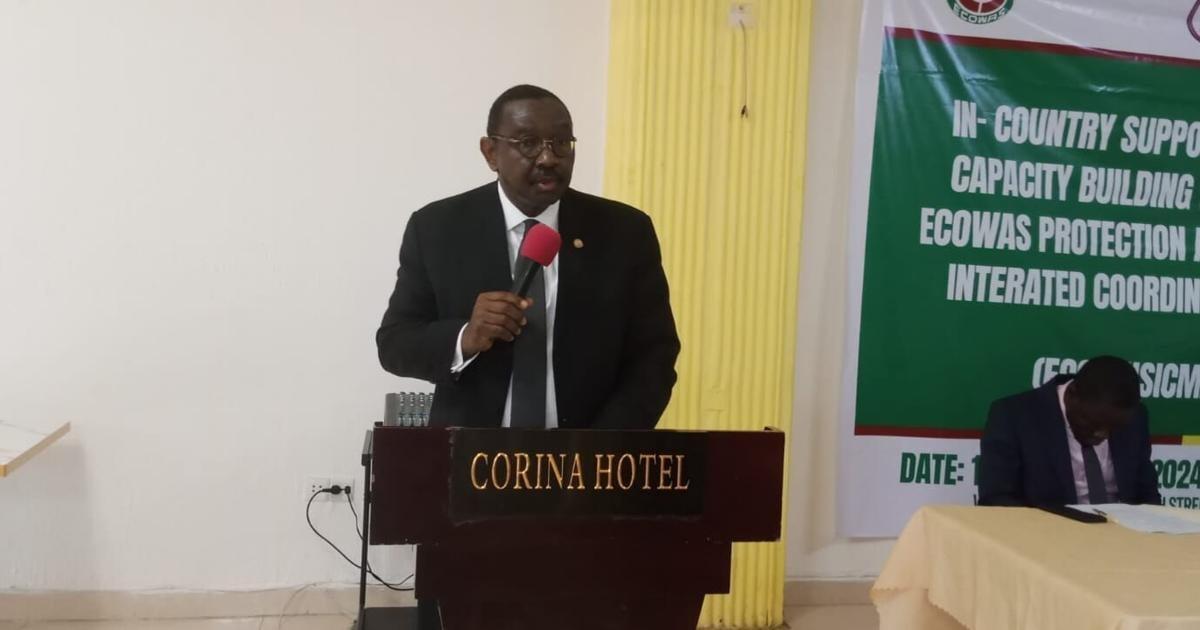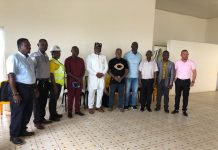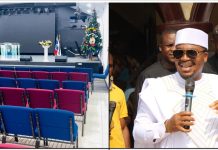Africa-Press – Liberia. Justice Minister Cllr. Oswald Tweh has emphasized the importance of prioritizing the protection and well-being of citizens of Liberia and people of the wider West African region against security threats.
Minister Tweh stressed that addressing internal and external threats is essential for economic, social, and political advancement, leading to a safer and more inclusive society.
Minister Tweh spoke at the opening ceremonies of the Economic Community of West African States’ (ECOWAS) three-day workshop held in Monrovia recently.
The workshop focused on strengthening the ECOWAS Protection and Human Security Integrated Coordination Mechanism (ECO-PHSICM) in Liberia and revising the mandates of the National Center for the Coordination of Response Mechanisms (NCCRM) within the ECOWAS framework.
“The protection of Liberians and citizens of the West African region against security threats should be a priority of stakeholders within the region,” the Minister told the gathering. “Mitigating pervasive threats that have confronted our people will go a long way in promoting economic, social, and political inclusion and ensure a safer country, and region.”
Minister Tweh reaffirmed the government’s commitment to this mechanism, highlighting its role in addressing challenges that impact the well-being and security of the people.
“This is not merely a framework but a lifeline of our nation that embodies our collective resolve to prevent and respond to the numerous challenges that threaten the wellbeing and security of our people,” Tweh said.
He added that the establishment and operationalization of the national secretariat, NCCRM are vital steps towards a safer, healthier, and more just society.
The establishment of the mechanism aims to strengthen collaboration among ECOWAS member states to address human security issues, including weaknesses in the rule of law, fundamental human rights, child protection, social protection systems, conflicts, humanitarian emergencies, and health pandemics.
It was against these backdrops that the ECOWAS Authority of Heads of States, the Commission on Humanitarian and Social Affairs initiated and is leading this effort aimed at strengthening mechanisms and developing necessary frameworks that will promote an integrated approach to addressing the many human security challenges.
Prince Gbardyu, who represented Vice President Jeremiah Kpan Koung at the ceremony, called for collaborative efforts to address the different issues that constitute national and regional security threats to the people of the region.
“Addressing the well-being of our people, and improving their living conditions should be of greater importance to us as stakeholders,” Gbardyu said. “Areas of national concerns such as economic, social, and political remain the growing security threats that we must confront, and this is the relevance of our presence in this room.”
He noted that stakeholders need to advance concerted efforts to strategize mitigation plans that will promote harmonious national and regional security.
Nathaniel Walker, who represents the ECOWAS Liberia office, said human security is an emerging paradigm for understanding vulnerabilities and addressing such holistically with a focus on the individual, families, and communities.
“ECOWAS is therefore committed to this and accelerating this approach in Liberia is crucial, relevant and timely,” Walker noted. “Mostly, in our sub-region, those affected are women and children, migrants, displaced persons (including refugees and Internally Let me point that out of), victims of human trafficking, and Stateless Persons.”
He described the training as crucial and demonstrates ECOWAS Human Security and Civil Society Division’s commitment to addressing the plight of persons most affected by rights and human security violations emanating from the realities in the region.
“This workshop is a great platform and forum for creating an understanding of the challenges and planning critical next steps,” he added.
The workshop focused on the revision of the mandates and functions of Liberia’s National Center for the Coordination of Response Mechanisms (NCCRM) within the ECOWAS framework. The NCCRM serves as an early warning response mechanism to notify authorities about potential threats to peace and security at a national, regional, or continental level.
The workshop brought together various stakeholders from the media, CSOs, the security sector, academia, youth, and women groups, and others to develop an action plan for enhancing human security and promoting harmonious national and regional security approaches.
For More News And Analysis About Liberia Follow Africa-Press






